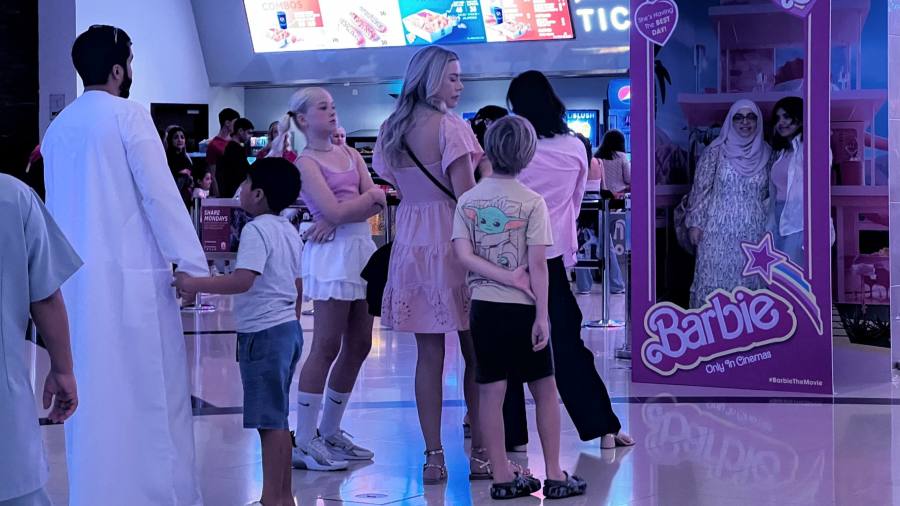Receive free Middle Eastern politics & society updates
We’ll send you a myFT Daily Digest email rounding up the latest Middle Eastern politics & society news every morning.
Cinemagoers in parts of the Middle East will have to wait a little longer to watch Barbie, Greta Gerwig’s pink-hued blockbuster about the iconic Mattel toy.
The film, which has grossed more than $1bn worldwide since its release last month, was scheduled to open in regional cinemas on Thursday after weeks of delays and debates over its themes that include gender, feminism and sexuality.
But at the last minute the conservative state of Kuwait announced an outright ban, saying the film promoted “ideas and beliefs that are alien to Kuwaiti society”. Lebanon’s culture minister also demanded a ban, saying the Barbie movie “contradicts religious values and morality” and “promotes homosexuality and sexual transformation”.
While Beirut’s censors will have the final say, the row over a film that broke studio records around the world comes amid increasing anti-LGBT+ rhetoric in Lebanon, driven by its sectarian political leaders who frequently weaponise social issues to rally support.
Other Gulf Arab countries, however, have so far taken a different tack. Barbie has made her screen debut in cinemas across the United Arab Emirates, Saudi Arabia, Qatar and Bahrain — countries that have made a big economic push on entertainment and tourism and have a high rate of foreign workers.
The film, which stars Margot Robbie as the titular Barbie and Ryan Gosling as partner Ken, follows the pair as they venture out from sheltered Barbieland and into the real world. It does not include scenes of a sexual nature, but the cast features openly gay and transgender actors.
Its success has been a big boost for the film industry, creating a cultural moment for legions of fans who have showed up to screenings from São Paulo to Beijing dressed in outlandish pink outfits, inspired by the doll.
But in the overwhelmingly conservative Arab world, where homosexuality and forms of gender expressions are still criminalised in most countries, the film has stirred outrage.
This is true even in Lebanon, one of the region’s most liberal countries that has long been home to vibrant LGBT+ communities. But they have increasingly come under fire from both hardline Christian and Muslim political leaders amid a clampdown on civil liberties.
The leader of the Iran-backed militant group Hizbollah, the country’s most powerful political and military force, has seized on LGBT+ issues to stir up his base and attract new supporters.
In televised speeches, Hassan Nasrallah has challenged educational materials that promote “this deviant culture”, urged protests of businesses carrying Pride flags and called for sodomy to be punishable by death. Dating app Grindr was forced to issue a warning for users in Lebanon over the rhetoric.
Elsewhere in the region, Iraqi regulators have mandated a ban on the word “homosexuality”, ordering media outlets and phone companies to refer to it as “sexual deviance”. Iraq prosecuted at least 20 people in the first six months of 2023 over what it deemed “indecent content” online, according to Amnesty International amid an increasing crackdown on LGBT+ rights.
The initial worldwide release date for Barbie was July 19, but it was delayed in parts of the Middle East until August 31 as authorities debated censoring some of its content.
Then last week, Warner Bros, the studio behind the film, said the release date had been brought forward to Thursday, prompting tickets to go on sale. But several cinema groups across the Middle East still list August 31 as the film’s official release date, including venues in Jordan and Iraq, throwing into doubt whether it would be shown at all.
It is not uncommon for films containing sexual content, LGBT+ themes or controversial religious plot lines to fall foul of Middle East censors. If a studio is unwilling to make adjustments demanded by censors, the films can be banned.
Sony’s Spider-Man: Across the Spider-Verse was not released in several Middle Eastern countries, most likely because of a scene featuring a “Protect Trans Lives” flag. But other films banned in the region over LGBT+ scenes, including Marvel’s Doctor Strange in the Multiverse of Madness in 2022 and The Eternals in 2021, were shown in Lebanon, demonstrating the arbitrary nature of the censorship.
Warner Bros declined to comment.
Read the full article here




